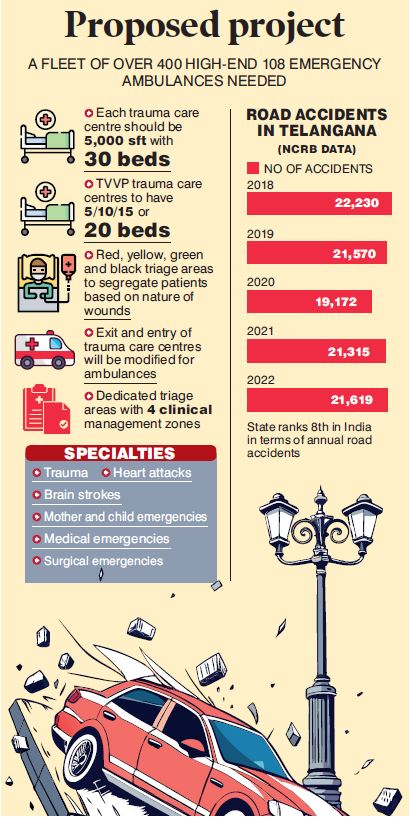Telangana Emergency Response Initiative hit by inordinate delays
Initiative planned by the previous BRS government aimed at providing timely life-saving emergency medical care, primarily for road accident victims, is experiencing significant delays.
Published Date - 31 August 2024, 10:14 PM
Hyderabad: The much anticipated Telangana Emergency Response Initiative (TERI), an initiative aimed at providing timely life-saving emergency medical care, primarily for road accident victims is hit by inordinate delays.
Initially planned for launch at the beginning of this year, inordinate delays continue to plague TERI, as the project, which was planned by the previous BRS government, is now under review.
The decision to restructure Telangana Vaidya Vidhan Parishad (TVVP) by the State government is also causing delays in its roll-out, officials familiar with the issue said.
There is also a question mark over financial allocation, which is crucial for long-term sustenance of the initiative. Barring a mere mention about the need to modernize trauma centres, the State government has not allocated exclusive funds in the State budget-2024-25.
Given the heavy burden of road accidents in Telangana, which is roughly between 20,000 and 21,000 per year, a concerted effort to develop trauma care centres and link-them to major national highways is vital for TS.
On an average, about 35 per cent of the cases in emergency/casualty at government hospitals are road trauma accidents. Even before getting admitted to a hospital, roughly 35 per cent of deaths take place and within 24-hours of admission to hospitals, about 40 per cent of trauma cases pass away.
To put a lid on the large number of fatalities, under TERI, it was planned to transport road trauma patients within the golden hour to any one of the proposed 55 trauma care centres, which are linked to national highways. The design and protocols for the scheme were developed based on a similar successful trauma care model in Tamil Nadu.
The break-up of the trauma care centres include NIMS, 17 teaching hospitals under Director of Medical Education (DME), 21 district hospitals and 16 Area Hospitals under Telangana Vaidya Vidhan Parishad (TVVP).
Another challenge for quick implementation of the scheme is the need to take-up exhaustive pre-hospital medical services including having trained trauma technicians to stabilize the patient’s first before transporting them to trauma care centres.
The emergency/casualty medical departments of all the identified 55 trauma centres have to be extensively revamped including procurement of high-end medical infrastructure, which could further delay the project.
